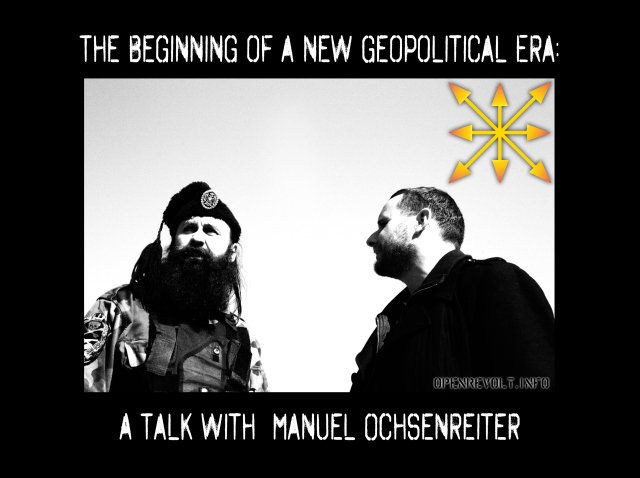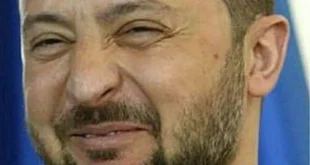James Porrazzo
Open Revolt
April 2, 2014
An honest journalist is an increasingly rare thing. None are more honest than Germany’s Manuel Ochsenreiter. Forget VICE, here’s a truly independent firsthand viewpoint on Crimea, Ukraine and much more.
Interview by James Porrazzo for Open Revolt.
Manuel you’ve recently traveled and stayed in Crimea just in time for the referendum concerning reuniting with Russia. First, we’re curious how was your reception in Crimea as a German journalist?
Ochsenreiter: It is the same reception you get everywhere “outside the Western sphere”. As soon as the people notice that you are not part of the mainstream media of your country, you are welcomed warmly and in a friendly manner. It is always good not to be part of the corporate lie industry.
What was the scene on the streets like leading up to this historic day? Here in North America the mainstream media painted a picture of Russian troops on the streets holding down dissent at the point of a bayonet.
Ochsenreiter: Not just in the US the mainstream media was broadcasting these fairy tales. In Germany also we “witnessed” a Russian invasion with tanks and lots of war material in Crimea. When I arrived in Simferopol I started searching for the Russian invasion. And I found out it took place but just on our western TV screens. Instead of those depressing “occupation scenes” I saw happy people in “reunification-fever”. Crimeans were looking forward to the referendum day.
It’s clear what the majority of the people of Russian orientations views are. Did you have a chance to speak to any other groups, like the Tartars? Or people who were clearly loyal to the junta in Kyev? Again, our occupied media here claim that they were (or are) facing hardships?
Ochsenreiter: First of all, I wonder where our Western mainstream media found all those anti-Russian Crimeans. Maybe the same place where they found masses of “peaceful protesters” in Syria? Of course I spoke with many people in Crimea and of course some were skeptical towards Moscow. But there were no “anti-Russian” people. I spoke with Tatars who were very angry at their anti-Russian “lobby” which is supported by Western NGOs, Washington, Ankara and Brussels. The point is: Many Tatars and other “Non-Russians” prefer to be part of Russia especially after seeing what is happening in Kiev these days. They choose security, peace and order (Moscow) instead of anarchy, chaos and hooliganism (Kiev).
Your photos with Cossacks and Serbian volunteers are quite moving. Were you able to get a feel for their positions and what inspired them to come to Crimea?
Ochsenreiter: Their motivation was idealistic. They wanted to help their Russian countrymen. Especially during the time before the referendum a lot of rumors about provocations from Kiev were being circulated in Crimea. People expected “Right Sector” hooligans coming to Crimea to disturb the referendum. The Cossacks were guarding public buildings. People were very happy about the Cossack presence in Simferopol. The Serbian Cetnik volunteers were serving at a road block close to Sevastopol.
How were the reactions on the street when the results of the vote were declared?
Ochsenreiter: It was a wave of happiness rolling over Crimea. The people were celebrating in the streets the whole night. It was a great experience especially as a German to witness this unique historical moment because we also had a reunification in 1990…
In addition to being an outstanding journalist, you are also an expert at geopolitics. Where do you see the events in Ukraine leading?
Ochsenreiter: The Crimea reunification with Russia is a geopolitical tsunami. For the first time since 1989/1990 a serious competition against the US hegemonial power has appeared in the horizon. All of a sudden the game has changed. Russia is not willing to tolerate anymore the Western push towards East. The reunification of Crimea with Russia is not the end for sure but the beginning of a new geopolitical era.
In our friendship with you we’ve seen you travel to Syria, then Crimea. What’s next for the truth seeking journalist Manuel Ochsenreiter?
Ochsenreiter: I just came back from Kosovo where I visited the Serbian community currently struggling for their survival. Kosovo is another geopolitical hotspot, forgotten right now but maybe all of a sudden actual in the future. We find there the same frontlines like in other geopolitical conflict areas: The West supporting criminal gangs as “freedom fighters”, spreading war lies and taking control by introducing the so called “open society” which means in reality “open market”.
Any final words for your supporters who read Open Revolt?
Ochsenreiter: Keep calm and trust Eurasianism!
Contact www.manuelochsenreiter.com
 Daily Stormer The Most Censored Publication in History
Daily Stormer The Most Censored Publication in History



